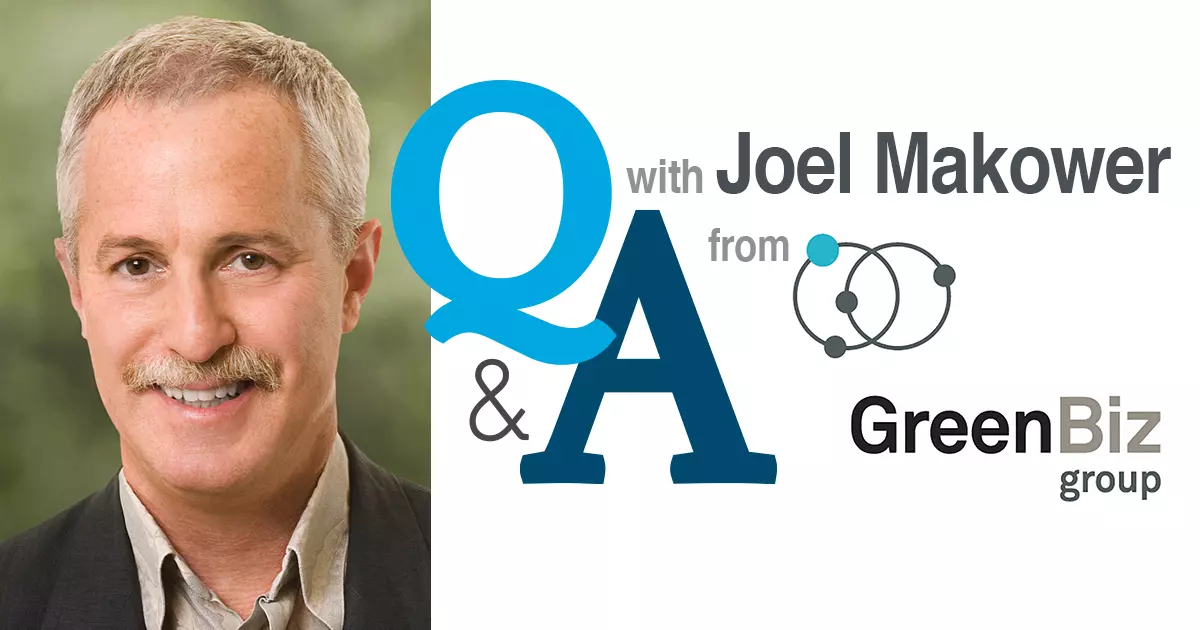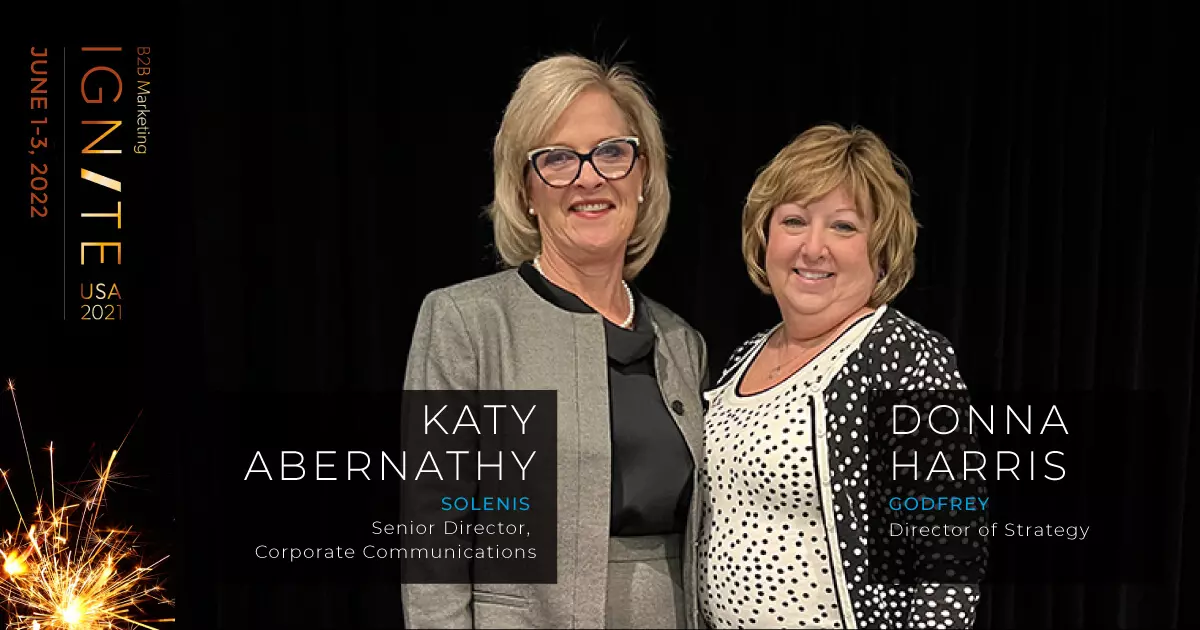ESG Insight: Q&A With Joel Makower From GreenBiz Group

The expert the Associated Press has called “the guru of green business practices” shares with us his perspectives on ESG and its importance to companies.
GreenBiz Group chairman and co-founder Joel Makower talks about how “societal expectations will increasingly require companies to have a good ESG/sustainability story to tell, one backed by verifiable data and, ideally, third-party validation. To aim for anything less these days is shortsighted, or worse.”
Read more from Joel:
1. If you would describe ESG and explain its importance to companies, what would you say?
ESG — a set of corporate metrics that track a range of company performance on social, environmental and governance issues — is now, finally, being linked to a company's financial performance as well as its ability to be profitable and resilient in a climate-constrained world. Not that long ago, these topics were seen as marginal, nice-to-do, "soft" issues that had no bearing on Wall Street.
That's changed, big time. Today, most mainstream investors, including the world's largest pension funds and asset managers, see strong ESG scores linked to lower risk, increased resilience and higher profitability. As a result, ESG has gone from the margins to the mainstream, with tens of billions pouring into these funds every year. The speed at which this has happened has, frankly, been astonishing.
2. Realizing there has been a shift from sustainability to larger ESG, why do you think this has occurred? What do you view as the key drivers behind this increased focus on ESG?
In a word, risk. Of course, there are a variety of kinds of risk: financial, reputational, transition, regulatory, supply chain, right to operate. Each of these links back, at least in part, to a company’s policies and performance on a range of social and environmental metrics. So, first and foremost, investors are homing in on ESG as a proxy for well-managed and high-performing companies.
But it’s not just investors. Employees — and prospective employees — are looking at ESG metrics to assess “good” companies to work for. And customers — more B-to-B customers than individual consumers, are asking for ESG data in their RFPs and procurement specs, since they themselves are grappling with their own carbon, water and energy footprints. Since, for most companies, 80 to 90 percent of their impacts come from within their supply chains, they are looking at upstream companies — suppliers — to help them reduce their impacts.
3. We work with B2B companies in a variety of industries — manufacturing, built environment, heavy equipment, chemicals, life sciences, material handling, to name a few. Within these industries, are there any companies that stand out to you as ESG leaders? If so, which ones and what makes them leaders? Are there key things they are doing that catch your attention?
I resist naming “good” companies. The reason is that while there are dozens of companies leading the way, each of them is flawed, usually with legacy impacts.
Consider auto makers. The world’s largest automotive companies — GM, BMW, Volkswagen, Ford, Daimler and all the others — are all pivoting to electric cars. Some have committed to phase out gas-powered vehicles in the coming years. Yet all of them have legacy issues, from toxic waste sites to a history of lobbying against proactive climate measures. Which is the good one? Even Tesla, the darling of many environmentalists, has been accused by the U.S. government of failing to prove that it is in compliance with standards for hazardous air pollutants. Its ESG score from the S&P Dow Jones Sustainability Index was 22 out of 100. Meanwhile, General Motors scored 75.
Or look at fast food. There aren’t many environmentalists who believe that this could ever be a “good” industry. Yet McDonald’s, the world’s largest, has been leading the way, from the design and operations of restaurants, to reducing wasteful practices, to convening a global roundtable to create standards for “sustainable beef.” Are they an ESG leader?
As I said, it’s complicated.
4. There have been a lot of companies hiring ESG-related positions. How do you see ESG responsibilities evolving within organizations?
It’s changing quickly. It wasn’t that long ago that ESG knowledge was a nice-to-have attribute in one’s job search. Today, it is a competitive advantage. I wrote earlier this year about an ESG talent war, as the demand for qualified applicants outstrips the supply.
What’s most interesting is that ESG professionals are not relegated to sustainability departments. There is demand for ESG expertise in finance, procurement, operations, human resources, marketing, communications, legal and other functions. That may be the best sign of all that ESG and sustainability are now core to profits and productivity, not an extracurricular activity. It’s a positive and encouraging development.
But that doesn’t mean that everyone who understands ESG metrics can find a job. As always, there are other criteria companies look for.
5. When it comes to measuring/evaluating and reporting on ESG-related initiatives, two questions:
a. Do you see any standardization on the horizon, and if so, what might it look like?
ESG reporting has been a mess. There are existing reporting standards and frameworks produced by organizations such as the Global Reporting Initiative (GRI), the Sustainability Accounting Standards Board (SASB), CDP and the International Integrated Reporting Council (IIRC), with more being proposed by the World Economic Forum (WEF), the International Financial Reporting Standards (IFRS) Foundation and the European Union. It’s confusing to companies that must report data, let alone to investors, customers and all the others interested in this data.
Simplification and harmonization are on the way. At long last, there are efforts to develop global standards for ESG reporting. Most notable is the International Financial Reporting Standards (IFRS) Foundation — the folks who establish accounting protocols used around the world — which is working on developing a set of standards that will sit alongside traditional financial reporting standards.
Meanwhile, here in the United States, the Securities and Exchange Commission is developing standards for companies to use in their quarterly 10-K reports and may be mandating certain types of disclosures. Last June, the U.S. House of Representatives passed legislation that would require public companies to report ESG metrics. The disclosure would be broad, as well as dictate specific reporting expectations on climate risks, political spending, CEO pay and taxation rates.
Not all of these things will be enacted, but the writing is on the wall: ESG reporting will no longer be optional, and reported data must be accurate and verifiable, not simply glossy pictures and happy stories.
b. What third-party recognitions do you think companies should focus on obtaining?
It depends on the sector, and on who the audience is. There aren’t many consumer-facing recognitions or certifications that have much appeal to the masses — the U.S. Energy Star being the exception, as well as possibly the U.S. government’s organic standard.
There are a lot more recognition programs at the local level. Communities around the world have their own “green business” standards, mostly but not exclusively for local firms. They can be as or more impactful than national or global awards.
Overall, the best third-party recognition is from satisfied customers!
6. Where do you go to obtain information or insight about a company’s ESG initiatives?
In short, anywhere and everywhere. Unfortunately, there is no comprehensive resource or clearinghouse to assess companies. Instead, there are 14,732 newsfeeds, blogs, podcasts and press services (not to mention authoritative sites like GreenBiz.com!) providing information.
One big challenge is that the information most relevant to risk and resilience can be buried deep in 10-K filings and sustainability reports. For example, efforts by a company to relocate sites to avoid coastal flooding or other disruptions won’t likely show up in a press release or other public accounts. So, too, with a lot of other efforts companies are taking. And increases in corporate R&D budgets to design new products, packaging or business models aren’t readily available.
Moreover, the things companies DO report — long-term net-zero commitments, for example — aren’t that accountable or verifiable, at least in the short term.
It’s become a cliché to say that the ESG is the Wild West, but that’s not far from the case. Most of us are left to our own devices to understand company initiatives, and it’s often hit or miss.
7. What is a piece of advice you would give to companies embarking on the ESG journey?
Jump in! The ESG and sustainability space can be overwhelming, but there’s no substitute for starting somewhere. But the incremental approach of yesteryear won’t cut it much longer. Societal expectations — not to mention those of investors and customers — will increasingly require companies to have a good ESG/sustainability story to tell, one backed by verifiable data and, ideally, third-party validation. To aim for anything less these days is shortsighted, or worse.
Thank you, Joel, for sharing your expertise!
Additional resources:
To read “The ESG Standard: Why Doing Good is Good for Business (Part 1)," visit our blog.
To hear about “Turning ESG Data Into Intelligence,” listen to our podcast with Paul Shahriari, Chief Innovation Officer and Founder of Ecomedes.
Sign Up for our Newsletter - Get agency updates, industry trends and valuable resources delivered directly to you.
Joel Makower - Chairman and Co-Founder, GreenBiz Group
Joel is chairman and co-founder of GreenBiz Group, a media and events company focusing at the intersection of business and the clean economy.
For more than 30 years, Joel has been a well-respected voice on business, the environment, and the bottom line. Among his many duties at GreenBiz, Joel hosts the annual GreenBiz forums and is lead author of the annual State of Green Business report.
In 2012, he was awarded the Hutchens Medal by the American Society for Quality, which cited “his ability to tell compelling stories that both inform and inspire business leaders toward profitable action.” In 2014, he was inducted into the Hall of Fame of the International Society of Sustainability Professionals.
A former nationally syndicated columnist, Joel is author or co-author of more than a dozen books, including The New Grand Strategy, published in 2016. Previous books include Strategies for the Green Economy, Beyond the Bottom Line: Putting Social Responsibility to Work for Your Business and the World, The E-Factor: The Bottom-Line Approach to Environmentally Responsible Business, and The Green Consumer. He also writes Two Steps Forward, a popular blog on sustainable business, clean technology and green marketing.
Joel has been a commentator on environmental topics for public radio's "Marketplace" and appears frequently in both broadcast and print media. He serves as a board member or adviser to both for-profit and nonprofit organizations and speaks regularly to companies, industry groups and business schools around the world.
Godfrey Team
Godfrey helps complex B2B industries tell their stories in ways that delight their customers.




